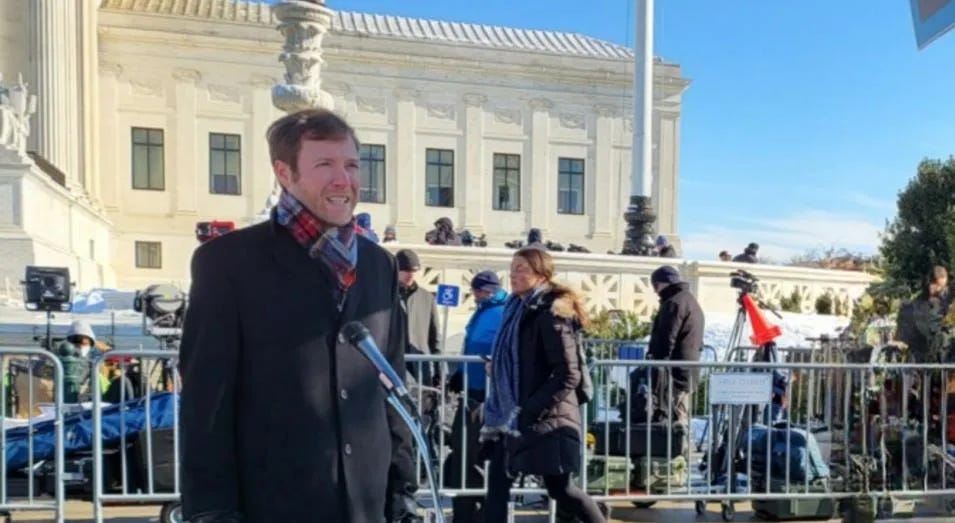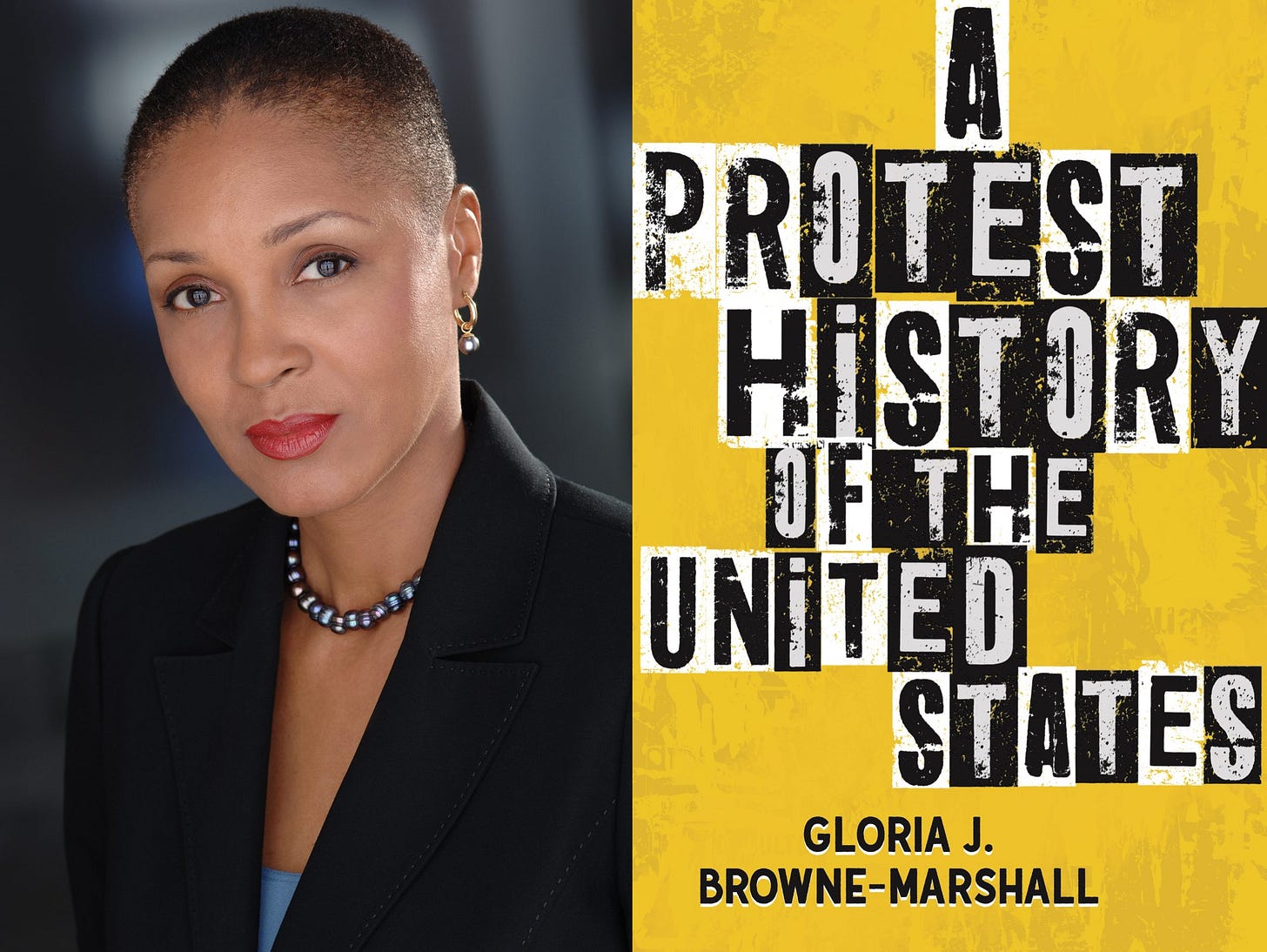The Monitoring of America: Trump group pushes for government-approved viewpoint ‘diversity’
First Amendment News 480
“Skydance Media is making new concessions to secure Federal Communications Commission approval of its proposed merger with Paramount Global — including a pledge to create an ombudsman to address concerns of media bias.”
— Reuters (7-23-25)
“The Resolution Monitor's responsibility is to monitor Columbia’s compliance with this Agreement.”
— Resolution Agreement between the United States and Columbia University (Clause 41)
The wolf is at the door when the federal government compels a media outlet, university, or law firm to permit a government-authorized third-party to approve or disapprove the content of their expression.
To that end, a government-approved “ombudsman,” or “monitor,” is required to supervise speech in the name of diversity, among other things. That, at least, is what is happening at CBS and Columbia University.
Get this: Such “inclusion” in the name of “diversity” advances the principle of “equity” (as in the long-discarded Fairness Doctrine). Or so it seems when it comes to Trump’s private lawsuits and his Administration’s speech “diversity” agenda. One group has championed such mandated “diversity,” and that group is The Center for American Rights.
To get a sense of this group’s influence in Trump’s compelled speech diversity campaign, consider the following statement from its press release of January 7, 2025:
The Center for American Rights is dedicated to ensuring fairness, transparency, and accuracy in public discourse, and accountability when media institutions fail those standards or break the law. Recent actions include:
Filing FCC and FEC complaints against ABC News for bias during the Harris-Trump debate.
Challenging Sixty Minutes for news distortion during a Vice President Harris interview.
Complaining about electioneering ads by The Washington Post.
Filing equal-time violations against NBC for Vice President Harris’s appearance on Saturday Night Live. [Links added]
This content diversity campaign, says the Center’s president Daniel R. Suhr in a July 23 press release, “is not asking this Commission to censor anyone or to invade anyone’s First Amendment rights.” Nonetheless, the Center is asking, among other things, the FCC “to ascertain whether late-night shows on broadcast channels are violating broadcasters’ public interest obligations by advancing private agendas. In re: Smith, 36 F.C.C.2d 690, 691 (1972).”
Monitoring the broadcast media: The CBS / Paramount Global case
As ironic as it appears, the call for “diversity” seems to be all the rage for the president and his supporters — but only the kind of diversity of which they approve. Consider the following petition to the FCC by The Center for American Rights:
In the Matter of Skydance Media and Paramount Global, Center for American Rights Petition to the FCC, Daniel R. Suhr, President, Center for American Rights (Dec. 16, 2024)
The lack of ideological diversity on the airwaves is an important concern for this Commission because it has real ramifications for our democracy. . . . Currently, broadcast television views lack a diversity of views for national nightly news, including CBS Evening News. The three national nightly news broadcasts — CBS Evening News, ABC World News Tonight, and NBC Nightly News — are all decidedly uniform in their editorial perspective and news approach. . .
The Commission must press the owners of New Paramount to commit to viewpoint diversity, with real benchmarks and expectations. This is a core part of the public interest standard, it is essential to democracy, and the Commission has recognized it as such over and over again. This transaction should help meaningfully address a serious lack in viewpoint diversity in broadcast television news by commitments to promote it in specific, meaningful ways. . .
[The FCC] must ask serious questions of Skydance and Paramount. These are two huge institutions with tremendous power in the modern media landscape. Their past track record indicates numerous recent activities at odds with the public interest as this Commission has defined it over the decades.
As a result, the Commission should condition its approval on specific commitments to rectify problems in these three areas, and place that approval on probationary status for a term of years until New Paramount has adequately demonstrated it will protect content from undue foreign influence, promote viewpoint diversity on the airwaves, and treat all employees and candidates equally without regard to race or gender. [Emphasis added]
Let us be honest: Any number of news and comedy TV programs are biased, even wildly so. See, e.g., Calder McHugh, “Why Late-Night Shows Won’t Roast Joe Biden,” Politico (May 3, 2024). But is not such bias as prevalent on Fox and Newsmax as it is on MSNBC and ABC? Why then are those media outlets not being subjected to content diversity requirements?
Monitoring the Press: The Iowa Pollster, Des Moines Register civil lawsuit case
Much to the same point, consider the following Jan. 7 press release by The Center for American Rights:
The Center for American Rights (CAR) filed a lawsuit in Iowa state court against the Des Moines Register, polling firm Selzer & Company and founder Dr. Ann Selzer, and DMR parent company Gannett Co., Inc. based on the incredibly inaccurate November 2024 Iowa Poll. The suit, filed just weeks after President Donald Trump’s litigation, expands the claims to include damages for subscribers misled by the recklessly published polling. The lawsuit focuses on Dr. Selzer’s nationally known November 2024 Iowa Poll, which inaccurately predicted Vice President Kamala Harris leading President Trump by 3 points. Trump ultimately won Iowa by a decisive 13-point margin (56% to 43%). Building on President Trump’s lawsuit, which highlighted harm to his candidacy, this case emphasizes consumer harm and accountability for misleading subscribers, who pay for accurate and trustworthy news.
FIRE fires back in related case
Plaintiff’s claims are barred by the First Amendment, and the Court should dismiss them with prejudice. In the United States there is no such thing as a claim for “fraudulent news.” No court in any jurisdiction has ever held such a cause of action might be valid, and few plaintiffs have ever attempted to bring such outlandish claims. – Trump v. Selzer (U.S. Dist. Ct., Central Dist., Iowa, 7-26-25)
From censorship boards to ‘ombudsman’ and ‘resolution monitors’
What is at work in all of this government-ordered monitoring and more is the federal government’s direct and indirect involvement in dictating (a.k.a., “monitoring”) the content of expression. Does any of this sound familiar? If not, consider the following, pulled from Wikipedia:
Chicago enacted the first censorship ordinance in the United States in 1907, authorizing its police chief to screen all films to determine whether they should be permitted on screens. Detroit followed with its own ordinance the same year. When upheld in a court challenge in 1909, other cities followed and Pennsylvania became the first to enact statewide censorship of movies in 1911 (though it did not fund the effort until 1914). It was soon followed by Ohio (1914), Kansas (1915), Maryland (1916), New York (1921) and, finally, Virginia (1922). Eventually, at least one hundred cities across the nation empowered local censorship boards.
Zick on Substack on Columbia University settlement
Tim Zick, “Columbia Caves,” Thoughts on the First (July 24)
Columbia University has agreed to “settle” its dispute with the Trump Administration by paying a $200 million+ fine and has agreed to make many other concessions. Columbia University agreed to (1) overhaul its disciplinary process to reduce faculty authority, (2) ban masks on campus, (3) add three dozen security officers authorized to arrest students and others, and (4) appoint a new Senior Vice Provost to oversee academic programs on the Middle East. You can read the whole “settlement” agreement here.
I’m using scare quotes regarding “settlement” because the fact is the University agreed to all these things without any evidence it had violated Title VI, the federal law the Trump Administration has used as a cudgel to shake down universities. Title VI obligates universities that receive federal funds to respond to instances of racial and other discrimination on campus. It has been interpreted to extend to discrimination against Jewish students. Yes, there is anti-Semitism on American campuses, including Columbia’s, just as there is anti-Semitism in American culture - and American political institutions for that matter.
[. . .]
The deal cuts at the heart of the university’s values and mission. Columbia’s concessions include trading away some degree of authority regarding admissions, educational programming, faculty governance, student discipline and speech rights, and other internal operations. To be sure, the agreement states that its provisions do not give the federal government ‘the authority to dictate faculty hiring, university hiring, admissions decisions or the content of academic speech.’ [Notice the limitation to “academic” speech only.] No, but it authorizes continual federal oversight and monitoring of all these matters and many, many more, that traditionally have been the province of the university - all under the threat of future governmental actions. Jawboning a university into altering how it governs, including policies about student discipline, campus protests, security, and viewpoint diversity does indeed undermine the values of the academic community.
Related
“Trump goes too far: Colbert cancellation puts spotlight on Trump’s war on the First Amendment,” MSNBC (July 26)
“Writers’ union urges investigation into Paramount move to cancel Colbert show,” The Guardian (July 18)
Zick on the logic behind Trump’s lawsuits
Tim Zick, “All the President's Lawsuits,” Thoughts on the First (July 26)
One of the exceptional things about Donald Trump, both as a presidential candidate and officeholder, is his litigiousness.
[. . .]
Trump is generally big on “winning.” But in this particular context, he doesn’t mind losing (good thing, too, since he nearly always loses in lawsuits). Courts have even ordered Trump to pay defendants hundreds of thousands of dollars for filing frivolous and harassing lawsuits. The civil actions he files, whether for defamation, “consumer fraud,” or “election interference,” aren’t about restoring Trump’s reputation (he won the election, after all, despite incorrect polling and allegedly altered Kamala Harris interviews), preventing consumer fraud, or preserving the integrity of elections. Rather, Trump’s civil actions serve political purposes.
First, the lawsuits burnish Trump’s reputation among his supporters as a crusader against the “fake” and “corrupt” media, which he claims continue to conspire against him. His lawyers draft complaints that are heavy on rhetoric and extremely light on facts and law.
[. . .]
Second, Trump hopes his lawsuits will cow media outlets into self-censoring in ways that improve his coverage or at least suppress negative stories. Even frivolous lawsuits can be harassing, intimidating, and exhausting.
[. . .]
Third, as President, Trump has combined lawsuits and federal agency proceedings to squeeze media corporations and bring them to heel. One of the signature goals of Trump 2.0 is to target civic institutions including law firms, universities, and the press to prevent them from checking his power. As President, Trump can use civil lawsuits in combination with agency proceedings, as he did against Paramount and Skydance, dangling the federal government’s approval of their merger with one hand while suing them for damages with the other.
[. . .]
Fourth, and finally, as recent events demonstrate Trump hopes his lawsuits against the media will distract people from negative news cycles and scandals, such as his cozy relationship with a deceased child sex trafficker. By crusading against the “crooked” press, he hopes to change the public narrative in his favor.
A sample of South Park episode mocking Trump
“‘South Park’ Mocks Trump In Jaw-Dropping Episode After $1.5B Paramount Deal, Access Hollywood (July 24)
Interview with Gloria Browne-Marshall, re: new book on history of protests
Susanna Granieri, “Legal Scholar Gloria J. Browne-Marshall on Her Book ‘A Protest History of the United States’,” First Amendment Watch (July 24)
In her latest book, “A Protest History of the United States,” constitutional law professor Gloria J. Browne-Marshall wrote: “To live under siege and still thrive and find joy, despite the oppressive and unnatural conditions of this country, is an immeasurable victory.”
Browne-Marshall examined the history of protest movements in the United States, including indigenous people’s rebellion to European colonization, the Civil Rights Movement, labor union uprisings, anti-war marches, women’s suffrage and more recent instances of demonstrations over violent policing and climate change.
[. . .]
In an interview with First Amendment Watch, Browne-Marshall discussed the criminalization of protest despite First Amendment protections, why protesters need to find ways to maintain their message and influence public opinion, and how the media can negatively influence a protest narrative.
So to Speak podcast: Congressman Justin Amash speaks to high schoolers on free speech
“Live with former Rep. Justin Amash,” FIRE (July 24)
Throughout his career, former Congressman Justin Amash has been a strong advocate for freedom of speech, writing that “The value of free speech comes from encountering views that are unorthodox, uncommon, or unaccepted...Free speech is a barren concept if people are limited to expressing views already widely held.”
In this special live episode, filmed in front of 200+ high schoolers attending FIRE's Free Speech Forum at American University in Washington, D.C., Amash takes questions from the audience and discusses his upbringing, his political career, the state of American politics, and how the Constitution guided his work in Congress.
Earlier this year, Congressman Amash joined FIRE's Advisory Council.
More in the news
“Fifth Circuit Rules Institute for Free Speech Can Challenge Texas Ethics Commission Ban on Pro Bono Work,” Institute for Free Speech (July 29)
Evan Mealins and Angele Latham, “News organizations sue Tennessee over police buffer law, citing First Amendment,” Knox News (July 29)
“Judge Issues Temporary Injunction Against Trump Administration Cancellation of Humanities Grants,” First Amendment Watch (July 28)
William Harris, “Will free expression make a comeback at Haverford College?” FIRE (July 28)
Eugene Volokh, “N.Y. Appellate Court Rejects Addictive Design Theory in Lawsuit Against Social Media Defendants Over Buffalo Shootings,” The Volokh Conspiracy (July 28)
Jennifer Huddleston, “Is AI a Horse or a Zebra When It Comes to the First Amendment?” Cato Institute (July 28)
Stephany Matat, “What to know about First Amendment issues in Trump's lawsuit against Wall Street Journal,” Tallahassee Democrat (July 28)
Helen Bushby, “South Park creators make mock apology to Trump,” BBC News (July 26)
David Bauder, “Did money or politics cause Colbert cancellation? Either way, the economics are tough for TV,” Free Speech Center (July 25)
“Hulk Hogan’s Sex Tape Lawsuit Had a Lasting Effect on Cases Involving Celebrity Privacy,” First Amendment Watch (July 25)
Nicole Markus, “State Department launches new investigation into Harvard,” Politico (July 23)
2024-2025 SCOTUS term: Free expression and related cases
Cases decided
Firebaugh v. Garland (arguments: Jan. 10)
Villarreal v. Alaniz (Petition granted. Judgment vacated and case remanded for further consideration in light of Gonzalez v. Trevino, 602 U. S. ___ (2024) (per curiam))
Murphy v. Schmitt (“The petition for a writ of certiorari is granted. The judgment is vacated, and the case is remanded to the United States Court of Appeals for the Eighth Circuit for further consideration in light of Gonzalez v. Trevino, 602 U. S. ___ (2024) (per curiam).”)
TikTok Inc. and ByteDance Ltd v. Garland (9-0: The challenged provisions of the Protecting Americans from Foreign Adversary Controlled Applications Act do not violate petitioners’ First Amendment rights.)
Cases for next term
Pending petitions
Petitions denied
MacRae v. Mattos (Thomas, J., special opinion)
L.M. v. Town of Middleborough (Thomas, J. dissenting, Alito, J., dissenting)
No on E, San Franciscans Opposing the Affordable Care Housing Production Act, et al. v. Chiu
Emergency applications
Yost v. Ohio Attorney General (Kavanaugh, J., “IT IS ORDERED that the March 14, 2025 order of the United States District Court for the Southern District of Ohio, case No. 2:24-cv-1401, is hereby stayed pending further order of the undersigned order of the Court. It is further ordered that a response to the application be filed on or before Wednesday, April 16, 2025, by 5 p.m. (EDT).”)
Free speech-related
Mahmoud v. Taylor (argued April 22 / free exercise case: issue: Whether public schools burden parents’ religious exercise when they compel elementary school children to participate in instruction on gender and sexuality against their parents’ religious convictions and without notice or opportunity to opt out.)
Thompson v. United States (decided: 3-21-25/ 9-0 w special concurrences by Alito & Jackson) (interpretation of 18 U. S. C. §1014 re “false statements”)
Last scheduled FAN
This article is part of First Amendment News, an editorially independent publication edited by Ronald K. L. Collins and hosted by FIRE as part of our mission to educate the public about First Amendment issues. The opinions expressed are those of the article’s author(s) and may not reflect the opinions of FIRE.






